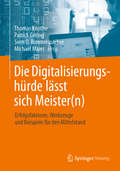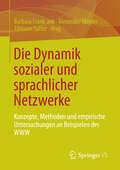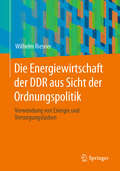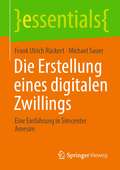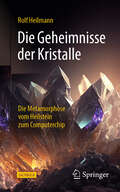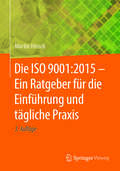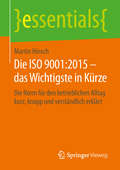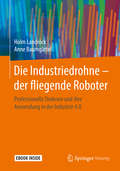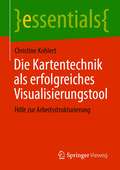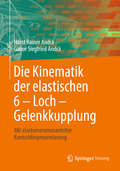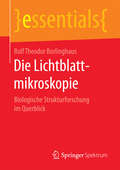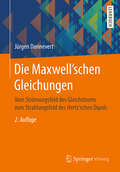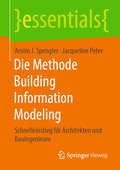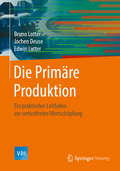- Table View
- List View
Die Digitalisierungshürde lässt sich Meister(n): Erfolgsfaktoren, Werkzeuge und Beispiele für den Mittelstand
by Thomas Knothe Patrick Gering Sven O. Rimmelspacher Michael MaierIn diesem Buch werden Lösungen zur Umsetzung von Industrie 4.0 auf dem betrieblichen Hallenboden beschrieben. Dabei wird insbesondere die Rolle des Meisters und dessen Weiterentwicklung im Kontext von Industrie 4.0 fokussiert. Anhand von Beispielen wird der Einsatz von Lösungen in der betrieblichen Praxis verdeutlicht.Ein Konsortium aus sechs mittelständischen Unternehmen und drei renommierten Forschungseinrichtungen stellte sich der Aufgabe die digitale Transformation für den Mittelstand auf dem Shopfloor zu vereinfachen.Frei nach Maxim Gorki: „Die Umsetzung von Industrie 4.0 muss für den Mittelstand genauso organisiert werden wie für große Unternehmen, nur viel besser“. Denn die Herausforderungen für KMU sind ungleich größer. KMU können es sich nicht leisten, dass teure Lösungen vorrangig als Spielzeuge zur Reputation von Vorständen dienen. Dabei sollen sie Mitarbeiter und Management nicht überfordern und an schnelle Änderungen anpassbar sein.Das Forschungsprojekt „JUMP 4.0 – Mobile Jobeinplanungsunterstützung für den Meister in der Produktion“ senkt dazu die Hürde zum Einstieg in die Industrie 4.0, speziell für den Mittelstand, auf ein Minimum. Ein neuartiges Prozessmanagementsystem ist spezifisch auf die Bedürfnisse der Meisterinnen und Meister, dem Alleinstellungsmerkmal des deutschen Mittelstandes, zugeschnitten. So kann deren Erfahrungswissen von Anfang an in den Produktionsprozess einfließen. Die entstandene Lösung ist konsequent auf existierende Standards und standardisierte Schnittstellen aufgebaut, sodass eine Erweiterbarkeit sichergestellt werden kann. Der modellbasierte Ansatz ermöglicht es, dass Prozesse auf dem Shopfloor dynamisch angepasst und gezielt durch das Erfahrungswissen der Meisterinnen und Meister abgesichert und überwacht werden können.Umrahmt werden die technologischen Entwicklungsmöglichkeiten durch Szenarien der Weiterentwicklung des Meisters mit einem Gastbeitrag von Prof. Dr. Hartmut Hirsch-Kreinsen.
Die Dynamik sozialer und sprachlicher Netzwerke
by Alexander Mehler Barbara Frank-Job Tilmann SutterIn diesem Band präsentieren Medien- und Informationswissenschaftler, Netzwerkforscher aus Informatik, Texttechnologie und Physik, Soziologen und Linguisten interdisziplinär Aspekte der Erforschung komplexer Mehrebenen-Netzwerke. Im Zentrum ihres Interesses stehen Untersuchungen zum Zusammenhang zwischen sozialen und sprachlichen Netzwerken und ihrer Dynamiken, aufgezeigt an empirischen Beispielen aus dem Bereich des Web 2. 0, aber auch an historischen Dokumentenkorpora sowie an Rezeptions-Netzwerken aus Kunst- und Literaturwissenschaft.
Die Energiewende: Eine allgemeinverständliche Einführung (essentials)
by Wolfgang OsterhageWolfgang Osterhage stellt, aufbauend auf den Grundlagen der Thermodynamik, die heute angebotenen technischen Lösungen der Energieumwandlung in nutzbare elektrische Energie und Wärme vor. Dabei beschreibt der Autor komprimiert sowohl traditionelle Kraftwerke als auch die aktuell bevorzugten Formen der Energiegewinnung durch Wind, Sonneneinstrahlung und Erdwärme. Er bietet damit ein Kompendium zum Verständnis der aktuellen Energiediskussion. Zum Schluss erfolgt ein Ausblick auf vielversprechende, aber technologisch noch unausgereifte Verfahren.
Die Energiewirtschaft der DDR aus Sicht der Ordnungspolitik: Verwendung von Energie und Versorgungslücken
by Wilhelm RiesnerDieses Buch stellt die Entwicklung der Energiewirtschaft in Ostdeutschland während der Zeit nach dem 2. Weltkrieg ab 1945 (Sowjetische Besatzungszone und nach 1949 Deutsche Demokratische Republik) zusammen. Anhand der in dieser Zeit entstandenen Gesetze und Verordnungen, die mit der Absicht zur Entwicklung der Energiewirtschaft verabschiedet wurden, werden die sich daraus ergebenden Resultate untersucht. Dabei sind auch die Auswirkungen auf die Bevölkerung allgemein sowohl im Beruf als auch im privaten Bereich sichtbar, die vor allem durch Verbote der Nutzung von elektrischer Energie und Gas, aber auch durch Umweltwirkungen – bedingt durch die extreme Nutzung der Rohbraunkohle als Primärenergieträger – entstanden. Deutlich wird auch der Versuch, durch Ordnungsprozesse in der Verwendung der Energie sowie durch den Einsatz von Kontrollorganen (Energieinspektoren) die ständig vorhandenen Versorgungslücken zu verringern.
Die Erde geht uns alle an: Warum gesunde Böden das Klima retten, deinen Körper heilen und die Welt gerechter machen
by Klemens KalverkampDie Erstellung eines digitalen Zwillings: Eine Einführung in Simcenter Amesim (essentials)
by Michael Sauer Frank Ulrich RückertDie Erstellung der ersten digitalen Zwillinge sollte intuitiv sein. In diesem Buch werden Zwillinge aus unterschiedlichen Bereichen vorgestellt, die ohne große Vorkenntnisse aufgebaut werden können. Dem Leser wird durch Praxisbeispiele ein Verständnis für die Handhabung von Simcenter Amesim vermittelt. Ohne tiefgreifende mathematische Fähigkeiten werden beispielsweise Lüftungs- und Tankanlagen, Sonnenkollektoren oder ein einfacher Wagenheber nachgebaut. Jedes Rechenbeispiel schließt mit Arbeitsvorschlägen, um den Umgang mit dem Zwilling zu schulen.
Die Geheimnisse der Kristalle: Die Metamorphose vom Heilstein zum Computerchip
by Rolf HeilmannKristalle – von den Wurzeln der Heilkunst zur Spitze der Technologie Kristalle, jahrtausendelang verehrt für ihre Perfektion in Form und Farbe, erzählen eine Geschichte, die tief in der Vergangenheit beginnt und bis in die Gegenwart reicht. Im vorliegenden Sachbuch enthüllt Prof. Dr. Rolf Heilmann die bemerkenswerte Evolution der Bedeutung dieser faszinierenden Mineralien. Das Werk bietet eine gründliche Analyse darüber, wie Kristalle – einst geheimnisvolle Symbole der Macht – zu unverzichtbaren Bausteinen moderner Technologien avancierten. Von der Erforschung der Grundstrukturen unserer Welt bis zur Fertigung von Solarzellen und Siliziumchips in Computern eröffnet Heilmann einen Zugang zur Welt der Kristalle, der sowohl Laien als auch Fachleute anspricht.
Die Gemeinsame Agrarpolitik der EU: Vergangenheit, Reformen und Gegenwart
by Sebastian LaknerDieses Buch bietet einen umfassenden Überblick über die Entwicklung der Gemeinsamen Agrarpolitik (GAP) der EU seit 1950, von ihren Anfängen vor fast 70 Jahren bis zu den jüngsten Reformen. Es beleuchtet die Herausforderungen und Erfolge der GAP und analysiert die Auswirkungen ihrer politischen Instrumente auf die europäische Landwirtschaft. In dem Buch, das für jedes Jahrzehnt seit dem 2. Weltkrieg und für alle großen GAP-Reformen ein Kapitel vorsieht, werden zentrale Konzepte wie ein Mindestpreis für Agrarprodukte oder Direktzahlungen an Betriebe behandelt. Wichtige Fragen, die das Buch aufwirft, sind: Wie haben sich die politischen Ziele der GAP im Laufe der Jahrzehnte verändert? Welche Reformen waren notwendig, um auf wirtschaftliche und ökologische Herausforderungen zu reagieren? Und welche Lehren können aus vergangenen Fehlentwicklungen gezogen werden? Dieses Buch richtet sich an Studierende und Wissenschaftler:innen der Agrarökonomie sowie an Praktiker:innen in der Agrar- und Umweltpolitik. Es bietet wertvolle Einblicke für alle, die sich mit der Geschichte und Zukunft der europäischen Agrarpolitik auseinandersetzen möchten.
Die ISO 9001:2015 - Ein Ratgeber für die Einführung und tägliche Praxis
by Martin HinschDie ISO 9001 ist die bedeutendste Systemnorm weltweit. Mit ihrer Umsetzung belegen Unternehmen ihre Qualifikation, dass sie Produkte oder Dienstleistungen bereitstellen können, die den Anforderungen der Kunden entsprechen, gesetzliche und behördliche Anforderungen erfüllen sowie die Kundenzufriedenheit erhöhen. Das Buch führt in die neue ISO 9001:2015 ein und erklärt detailliert alle für den betrieblichen Alltag wichtigen Anforderungen. Den Schwerpunkt des Buches bildet die ausführliche Erläuterung und Übersetzung des eigentlichen Normentextes in die Sprache des betrieblichen Alltags. Der Aufbau des Buches orientiert sich dazu exakt am Aufbau der ISO 9001:2015. In einem eigenen Kapitel gibt das Buch dabei auch umfassende Hinweise für den Zertifizierungsprozess inkl. Vorbereitung, Auswahl eines Zertifizierungsauditors und eines Zertifizierungsinstituts, Auditdurchführung, Abarbeitung von Beanstandungen und Zertifikatsausstellung. In der 3. Auflage dieses erfolgreichen Ratgebers sind bereits Zertifizierungserfahrungen und Umsetzungsherausforderungen mit der ISO 9001:2015 berücksichtigt. Des Weiteren wurden praktische Tipps für ein erfolgreiches Zertifizierungsaudit ergänzt.Die ZielgruppeDas Werk wendet sich an Qualitätsmanager und andere Mitarbeiter mit Qualitätsverantwortung.
Die ISO 9001:2015 – das Wichtigste in Kürze
by Martin HinschMartin Hinsch fasst die Inhalte der ISO 9001:2015 in Kürze zusammen. Er bietet sowohl Einsteigern als auch Nutzern mit wenig Normenkenntnissen gleichermaßen eine Einführung oder Auffrischung in die weltweit bedeutendste Management-Systemnorm. Jedes einzelne Normenkapitel wird dazu thematisiert. Das Werk richtet sich vor allem an jene QM-Interessierten, die ein grundlegendes Verständnis zur Norm kurz, knapp, präzise über alle für den betrieblichen Alltag relevanten Anforderungen erlangen möchten. Für weitere, über dieses Kompaktwerk hinausgehende Informationen wird auf das Grundlagenwerk Die ISO 9001:2015 – Ein Ratgeber für die Einführung und tägliche Praxis verwiesen.Der AutorDr. Martin Hinsch ist Experte für luftfahrttechnisches Qualitäts-, Safety- und Prozessmanagement. Er ist als Auditor für die ISO 9001:2015 und die Luftfahrtnorm EN 9100 zugelassen. Hinsch ist Professor für Betriebswirtschaft und lehrt an der IUBH – Internationale Hochschule in Hamburg. Über seine Unternehmensberatung unterstützt er Unternehmen beim Aufbau von QM-Systemen.
Die Industriedrohne – der fliegende Roboter: Professionelle Drohnen Und Ihre Anwendung In Der Industrie 4. 0
by Holm Landrock Anne BaumgärtelDrohnen sind mittlerweile zu intelligenten Systemen für Industrie 4.0 herangereift. Die neuen Flugroboter verfügen über Sicherheitstechnologien, Flugzeiten und Zuladegewichte, die für den Einsatz in der Energiewirtschaft, Behörden der Sicherheit und Verteidigung, Agrarwirtschaft, Kommunikation und Infrastruktur zunehmend nutzbar sind. Genau hier setzen die Autoren – Fachjournalisten mit Insiderwissen über Technik, Markt und Kundensicht – mit ihrem Buch an.Das kompakte Fachbuch gibt praktischen Einblick in den Aufbau und die Technik von Drohnen, sog. Multicoptern. Es zeigt zudem die Einsatzgebiete von Industriedrohnen und erläutert die wichtigsten gesetzlichen Regelungen und Vorschriften für Entscheider aus der Wirtschaft, in denen smarte Robotik aus der Luft relevant wird. Praxisbeispiele aus verschiedenen Branchen und Basisanforderungen an die Industriedrohne – dargestellt in übersichtlichen Tabellen – runden das Buch ab.Das Buch richtet sich an alle, die sich zum Wachstumsmarkt "Drohne" einen Überblick verschaffen möchten. Als Entscheider in der Industrie erfahren Sie hier, wie sich etwa Bereiche wie die Petrochemie oder die Landwirtschaft durch den Einsatz von Drohnen automatisieren lassen. Auch Sektoren wie der Katastrophenschutz und die Sicherheitstechnik profitieren vom Einsatz von Industriedrohnen und lassen sich durch sie noch effektiver gestalten. Auch Wissenschaftlern und Journalisten, die in den Bereichen Industrie 4.0 und Robotik forschen und schreiben und Privatleuten mit einem generellen Interesse an den Einsatzmöglichkeiten für professionelle Drohnen liefert das Buch kompakt und strukturiert alles Wissenswerte zu Multicoptern in den Zeiten der Industrie 4.0.
Die Kartentechnik als erfolgreiches Visualisierungstool: Hilfe zur Arbeitsstrukturierung (essentials)
by Christine KohlertDie in diesem essential vorgestellte Visualisierungstechnik ermöglicht es, ein Höchstmaß an Kommunikation und Wissensaustausch am Arbeitsplatz zu erreichen und die notwendige Transparenz in die Arbeitsprozesse zu übertragen. Mit der Kartentechnik wird jede Aufgabe bereits zu Anfang mit Bildern beschrieben. Dabei setzen Piktogramme und schnelle Zeichnungen die Diskussionen der Workshops – in Echtzeit – in für alle verständliche Bilder um. Alle Beteiligte werden von Anfang an Teil des Teams und können so alle Informationen in die Nutzeranforderungen einfliessen lassen.
Die Kinematik der elastischen 6 – Loch – Gelenkkupplung: Mit elastomerummantelter Kordschlingenarmierung
by Horst Rainer Andrä Gabor Siegfried AndräDas Buch behandelt umfassend die Kinematik einer elastischen Gelenkkupplung , wie sie derzeit von unterschiedlichen PKW-Herstellern in Großserie eingesetzt wird. Die wesentlichen Kupplungsparameter werden im relevanten Anwendungsbereich variiert und Ihre Wirkung auf den Bewegungsablauf in Umfangs- und axialer Richtung sowie auf das sog. Rückstellmoment, welches bei Beugung der Kupplung auftritt, wird untersucht. Die Elemente der Gelenkkupplungen erfahren unter Beugung der Gelenkwelle, sowohl ohne als auch mit kombinierter Drehmomentbeaufschlagung komplexe räumliche Verformungen, die als Reaktionen Radial-, Axial- und Umfangskräfte sowie Ausgleichsbewegungen in der Gelenkkupplung hervorrufen. In axialer Richtung führt der innere Kraftausgleich zu einer in 3. Ordnung zum Umlauf schwingenden Bewegung, deren Amplitude mit zunehmendem Beugewinkel überproportional steigt. Die Ausgleichsbewegung in Umfangsrichtung erfolgt hingegen sechsmal pro Umdrehung der Antriebswelle und ihre Amplitude bleibt im Anwendungsbereich von Beugewinkeln
Die Kosten von erneuerbarer Stromerzeugung mit Energiespeicherung: Eine techno-ökonomische Berechnungsmodellierung auf der Grundlage realer Daten aus Windkraft und Sonnenkraft
by Nico WehrleWindkraft und Sonnenkraft sind erneuerbare und günstige Stromquellen. Diese Aussage ist häufig in den gegenwärtigen Diskussionen über die zukünftige Stromversorgung zu hören. Hierbei handelt sich jedoch um Stromgestehungsmethoden mit hohen volatilen Anteilen, so dass mit deren zunehmendem Anteil, Ausgleichssysteme wie Energiespeicher erforderlich werden. An diesem Punkt setzt das vorliegende Werk an und beschreibt die Grundlagen, Voraussetzungen und die Entwicklung zweier techno-ökonomischer Berechnungsmodelle. Darin werden neben der Berechnung der erforderlichen Speicherkapazitäten, auch die Kosten für die gesamtheitlichen Systeme und deren anfallende Verluste betrachtet. Es wird ein Berechnungsansatz präsentiert, der insbesondere die Problematik der hohen Kosten von Speichersystemen aufgreift und diese in ein Verhältnis zur Stromerzeugung setzt. Die resultierenden Ergebnisse sind am Beispiel des deutschen Stromversorgungssystems veranschaulicht und liefern eine Abschätzung, welche Stromkosten mit einer vollständig volatilen Stromversorgung zu erwarten sind.
Die Leistungsbeschreibung und ihre Nachträge: Schnelleinstieg für Architekten und Bauingenieure (essentials)
by Andrea FaggianoDieses essential beleuchtet exemplarisch anhand der Leistungsbeschreibung „Baustelleneinrichtung“, dass bereits in der Phase der Ausschreibung einer Leistung Fehler entstehen können, die später große Auswirkungen auf die Kosten haben.Fallstricke in der Leistungsbeschreibung und Lösungsansätze für Auftraggeber und Planer werden aufgezeigt und es werden Möglichkeiten einer sicheren Darstellung von Zusatzleistungen vorgestellt.
Die Lichtblattmikroskopie: Biologische Strukturforschung im Querblick (essentials)
by Rolf Theodor BorlinghausIn diesem essential wird erl#65533;utert, was die Lichtblattmikroskopie von gew#65533;hnlicher Lichtmikroskopie unterscheidet. Der Autor beleuchtet kurz die Historie solcher Verfahren, wobei der Schwerpunkt auf den technischen Konzepten liegt. Schlie#65533;lich werden aktuelle Erscheinungsformen vorgestellt, ohne in die Tiefen der Ingenieurskunst hinabzusteigen. Die Ungew#65533;hnlichkeit der Lichtblattmikroskopie besteht nicht nur darin, dass Betrachtung und Beleuchtung unter einem rechten Winkel stattfinden, vielmehr gewinnt diese Art der Mikroskopie vor allem dadurch, dass durch die Art der Beleuchtung nur ein ganz kleiner Teil des Pr#65533;parates durchstrahlt wird. Die geeignete Auswahl der optischen Elemente sorgt daf#65533;r, dass das beobachtete Bild keine unscharfen Anteile mehr enth#65533;lt.
Die Masse eines Photons: Randnotizen der Elektrotechnik
by Josef von StackelbergDieses Buch beschreibt Zusammenhänge der erweiterten Elektrotechnik, die in dieser Form und Sichtweise bisher nicht beschrieben wurden, z. B. Erklärung des Gravitationsfeldes auf der Basis elektromagnetischer Effekte, Berechnung der Photonenmasse aus diesen Effekten, Ersatz der Permeabilitäts- und der Permittivitätskonstante durch die Lichtgeschwindigkeit, thermisch korrekte Darstellung der Diodengleichung usw.
Die Masse eines Photons: Randnotizen der Elektrotechnik
by Josef von StackelbergDieses Buch beschreibt Zusammenhänge der erweiterten Elektrotechnik, die in dieser Form und Sichtweise bisher nicht beschrieben wurden, z. B. Erklärung des Gravitationsfeldes auf der Basis elektromagnetischer Effekte, Berechnung der Photonenmasse aus diesen Effekten, Ersatz der Permeabilitäts- und der Permittivitätskonstante durch die Lichtgeschwindigkeit, thermisch korrekte Darstellung der Diodengleichung usw.
Die Maxwell'schen Gleichungen
by Jürgen DonnevertIm Zentrum des Bandes steht die Herleitung der Maxwellschen Gleichungen und deren Lösung. Die Stationen auf diesem Weg sind die Gesetze des Strömungsfeldes, der Elektrostatik und Magnetostatik. Der Band richtet sich an Studenten der Elektrotechnik und Informationstechnologie und an Studenten des Faches Physik mit dem Ziel, ihnen den Einstieg in die Vorlesung Elektromagnetische Feldtheorie zu erleichtern. Der Band baut auf den Kenntnissen auf, die in den Leistungskursen Physik und Mathematik der Gymnasien und Gesamtschulen vermittelt werden und ist zum Gebrauch neben den Vorlesungen gedacht. Besonderer Wert wird auf ausführliche Erklärungen in Textform in Verbindung mit vielen Abbildungen gelegt. Alle Formeln werden Schritt für Schritt hergeleitet.
Die Maxwell'schen Gleichungen: Vom Strömungsfeld des Gleichstroms zum Strahlungsfeld des Hertz'schen Dipols
by Jürgen DonnevertIm Zentrum des Bandes steht die Herleitung der Maxwell'schen Gleichungen und deren Lösung. Die Stationen auf diesem Weg sind die Gesetze des Strömungsfeldes, der Elektrostatik und Magnetostatik. Der Band richtet sich an Studenten der Elektrotechnik und Informationstechnologie und an Studenten des Faches Physik mit dem Ziel, ihnen den Einstieg in die Vorlesung Elektromagnetische Feldtheorie zu erleichtern. Der Band baut auf den Kenntnissen auf, die in den Leistungskursen Physik und Mathematik der Gymnasien und Gesamtschulen vermittelt werden und ist zum Gebrauch neben den Vorlesungen gedacht. Besonderer Wert wird auf ausführliche Erklärungen in Textform in Verbindung mit vielen Abbildungen gelegt. Alle Formeln werden Schritt für Schritt hergeleitet.Für die aktuelle 3. Auflage wurde der Abschnitt „Induktionsgesetz“ grundlegend überarbeitet und in das vierte Kapitel verschoben, ebenso die Abschnitte „Induktivität“ und „Energiedichte des magnetischen Feldes“. Der Begriff „Durchflutungsgesetz“ wurde in Anlehnung an die angelsächsische Bezeichnung in „Ampèr´sches Gesetz“ umbenannt.
Die Maxwell´sche Theorie: Für Ingenieure und Master-Studenten (essentials)
by Martin PoppeMartin Poppe stellt die Maxwell'schen Gleichungen vor und interpretiert sie vor dem Hintergrund wichtiger Ergebnisse der Grundlagenforschung. Seine zentralen Anliegen sind Verständlichkeit und Anwendbarkeit. Daher verzichtet der Autor auf die im neunzehnten Jahrhundert eingeführten und mittlerweile als redundant erkannten Hilfsgrößen. So wird die Theorie einfacher, übersichtlicher, leichter zu nutzen und von weit verbreiteten Missverständnissen befreit.
Die Methode Building Information Modeling: Schnelleinstieg für Architekten und Bauingenieure (essentials)
by Arnim J. Spengler Jacqueline PeterArnim J. Spengler und Jacqueline Peter bieten einen Schnelleinstieg in die BIM-Methodik. Zunächst geben sie einen grundsätzlichen Einblick, zeigen die Bedeutung von BIM auf und klären die wichtigsten Begrifflichkeiten des Themenfeldes. Danach wird die Methodik aus den unterschiedlichen Sichtweisen aller Akteure im Bauwesen entlang des Lebenszyklus eines Bauwerks beleuchtet sowie die wichtigsten Normen, Richtlinien und Vereinigungen vorgestellt und untereinander in Bezug gesetzt. Eine SWOT-Analyse zeigt kurz und prägnant Stärken, Schwächen, Risiken und Chancen von BIM. Im Anschluss gewähren die Autoren einen schnellen Einblick in die Forschung und geben einen kurzen Ausblick über neue Technologien wie Blockchain, Künstliche Intelligenz, Robotik und IoT in Verbindung mit der BIM-Methodik.Die Autoren:Arnim J. Spengler, M.Sc., forscht an der Universität Duisburg-Essen im Bereich Robotik und digitales Bauen, ist Teil der Projektgruppe „BIM-Competence-Center“ des MHKBG NRW, Mitgründer des BIM-Clusters NRW und des Construction-Tech Startups BuildersMind GmbH. Jacqueline Peter, M.Sc., lehrt und forscht am Institut für Digitalisierung im Bauwesen an der Universität Duisburg-Essen und ist stellvertretendes Koordinierungsmitglied im BIM-Cluster NRW.
Die Next
by Jonathan StoneFrom bestselling author Jonathan Stone comes a pulse-pounding thriller for the digital age that will make you question everything that you have ever saved on your phone. In a crowded coffee shop, Zack Yellin swaps identical-looking cell phones with the businessman next to him. It's an honest mistake-and a deadly one. Because the "businessman" is actually a professional-and highly volatile-hit man named Joey Richter, and his phone is filled with bombshell evidence. If Zack takes Joey's phone to the police, will they believe his swapped cell phone story? Would they even be able to protect him? Because the hit man now has Zack's phone with the phone numbers and addresses of Zack's new girlfriend Emily, his best friend Steve, and all the texts and information from Zack's life. Whether Zack keeps the phone or ditches it, Joey will kill him for what he now knows. In cat-and-mouse twists, turns, and continually mounting terror, one thing is clear: Zack is next on the hit man's list.
Die Primäre Produktion
by Bruno Lotter Jochen Deuse Edwin LotterDas Buch stellt einen ausgereiften Leitfaden vor, wie Produkte und Arbeitssysteme so zu gestalten sind, dass sowohl wirtschaftliche wie ergonomische Forderungen aufgrund des demografischen Wandels erfüllt werden. Dies geschieht aufbauend auf der bewährten Primär-Sekundär-Analyse als methodischem Fundament. Konkrete Beispiele verdeutlichen die Vorgehensweise im Detail. Die stetige Produktivitätssteigerung produzierender Unternehmen ist im globalen Wettbewerb unverzichtbar. Als Leitgedanke hierzu dient eine Produktion, die Verluste durch nicht wertschöpfende sekundäre Aufwendungen vermeidet und möglichst nur primäre, also wertschöpfende Aufwendungen, leistet. Insgesamt wurden die Erkenntnisse aus mehreren Verbund-Forschungsvorhaben und vielen realisierten Industrieprojekten praxisgerecht aufgearbeitet und zur unmittelbaren Nutzung für die Produktionsindustrie bereit gestellt. Ihre schrittweise und geduldige Umsetzung bietet einen erfolgversprechenden Weg zu einer verschwendungsfreien Wertschöpfung.
Die Schlacht um Europas Gasmarkt: Geopolitische, wirtschaftliche und technische Hintergründe
by Oleg Nikiforov Gunter-E. HackemesserEuropa wird zum Spielplatz verschiedener Weltkräfte, die um die Gaslieferungen nach Europa kämpfen. In erster Linie sind die wirtschaftlichen Aspekte dieser Bestrebungen analysiert. Eine wichtige Rolle spielen der Bedarf mit der Berücksichtigung der vorhandenen europäischen Energieprogramme sowie Umwelt- und Klimabeschlüsse, die allgemein verständlich dargelegt sind. Außerdem sind die Regel- und Gasvorräte der Gas anbietenden Lieferanten erklärt. Vor diesem Hintergrund werden auch politische Auseinandersetzungen ausgewertet.
